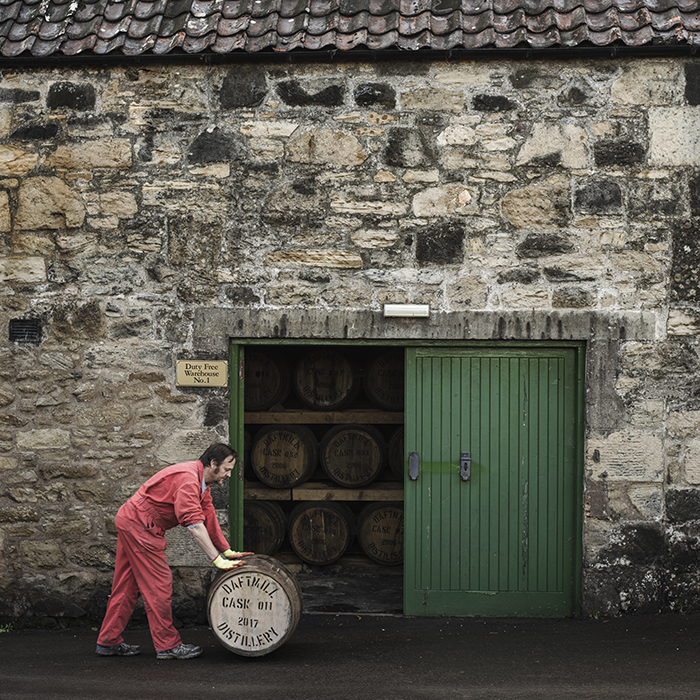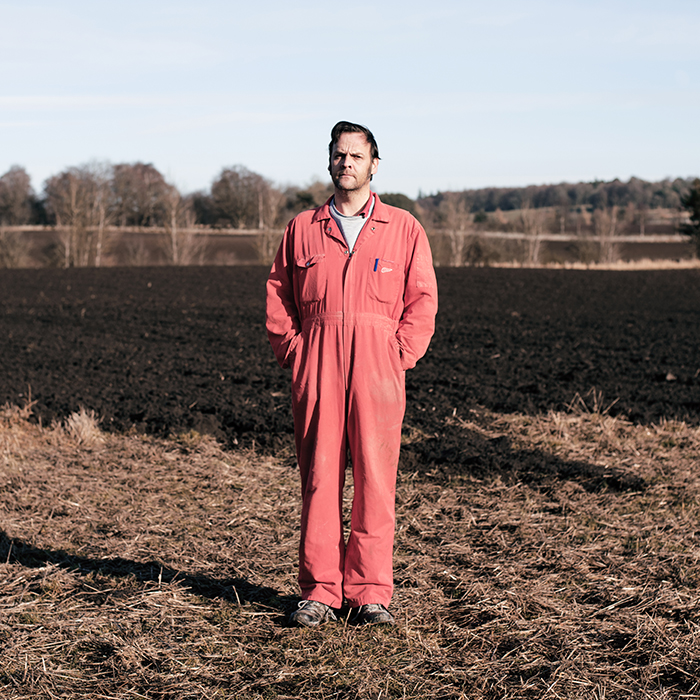Daftmill: an honest dram
Author: Jonny McMillan

Generally, when one first discovers that Scotch whisky is undoubtedly the finest liquid on the planet, there are a few years spent in complete fascination. You buy multiple varieties of whisky glass, start posting nothing other than pictures of whisky labels on social media, and, of course, devour the books of Charles MacLean and Dave Broom (not to mention watching Richard Paterson threatening uninitiated drinkers over glass-holding etiquette via YouTube).
Often, however, once one truly pops the bung on the industry, it can be a little disheartening to find that most barley is sourced from further afield than Scottish fields, or that your favourite wee distillery may fill upwards of 200 casks per day on a relentless 24/7 production regime.
In a world where Scotch whisky seems to be drifting away from transparency and lurching towards nebulous marketing ploys, the chronic, final-stage whisky nerds (and I include myself in this description) will always be drawn to honesty amidst the storm of non-age-statement liquid and humongous wooden boxes. And this leads us to why Daftmill has become an instant hit; finally, here is a distillery whose whiskies speak with integrity, sincerity and honesty.
Though Daftmill began production in 2005, there was no garish press release or opening of a plush visitor centre. In fact, over the next decade Daftmill put zero effort into marketing at all, releasing nothing until the spirit was 12 years old. This may well be because their de facto “Head of Marketing” is also the sole distiller, farmer and is in fact the distillery owner. Daftmill is the only family-owned and -operated distillery currently releasing whisky and is a true farm distillery.

The distillery is owned by brothers Francis and Iain Cuthbert, with Francis heading up the distillery. It is crucial, however, to note that the distillery is a secondary business to their farm. While the farm is busy through spring and autumn, the distillery is silent; only in the less agriculturally labour-intensive months – across winter and summer – will the distillery come to life. This means that Daftmill barely fills 100 casks per year – making it one of Scotland’s smallest distilleries. While this seasonal production cycle is today unique among distillers, it harks back to the 1800s, when farmers would produce whisky only a few months a year, often as a way to use up, preserve and add value to barley.
The low amount of spirit produced also means that Francis can grow all the barley he requires for distillation on his own land. So far, Daftmill is the only distillery that has released whisky made exclusively with its own farm’s crop.
For those who are lucky enough to visit the distillery in Fife (which is not open to the public), it is instantly clear that Daftmill focuses on quality above all else. Generally showing guests around in his farm overalls, Francis is perhaps the humblest man in the whisky industry. With a sense of humour so dry it’s evaporated, Francis will rarely compliment his own production – and yet clearly puts a dogmatic focus on producing spirit of the highest calibre.
And the result? The beauty of Daftmill’s whisky is in its seasonal and vintage variations. Some years – such as 2006 and 2007 – come across as vibrant, floral and very fruity drams, while 2008 and 2009 display a drier, sometimes herbaceous note. And yet there is a certainly a common distillery character running throughout.
Daftmill’s only downside is that the tiny output means its whiskies often sell out on the day of release. Progressive initiatives, however, such as their partnership with The Whisky Bars of Scotland, are proof of Francis’s determination that their whisky will reach the hands of those who want to drink it.
For me, Daftmill is quickly earning its place amongst the “Grands Crus” of Scotch whisky distilleries. I believe in decades to come it will be spoken of in the same breath as Springbank, Glenfarclas and Bowmore – but for now we can certainly agree it’s a good, honest dram.



How much is a bottle, I would love to be included
I am fascinated by the whole process carried out by the family running the Daftmill distillery, and I look forward to tasting their whisky as soon as possible, as I am sure it will be surberb
Before I enter the ballot for the Daftmill I should like to know what it might cost.
Thanks
Hi Pat,
The 2007 Winter Batch Release is £105 a bottle.
Best,
Sophie
Editor
Hi Dori,
The 2007 Winter Batch Release is £105 a bottle.
Best,
Sophie
Editor
Good morning!
I entered the ballot, but no confirmation email arrived. It’s normal? when will the winners be known?
Hi Andrei,
It is indeed normal; no confirmation email is sent. Winners will be informed by the end of the month.
Thanks,
Sophie
Editor
Hello,
I have tried to enter the ballot but when I press on the link, it takes me back to the beginning.
Please may I be included? Many thanks Phil
Hello Phil,
Our apologies, the ballot has now closed – I’ve now amended the post to reflect this. You can however register interest in future releases if you follow the revised link.
Very sorry again,
Sophie
Editor
Dear Sophie,
When will I know if I have won or lost the ballot?
Thank you
Dear Andrei,
I’m afraid that winners have already been notified.
Best,
Sophie
Editor
Hello. I’m new to whisky. Keen to try a bottle of Daftmill. How do I buy a bottle and if possible a bottle from eaxh release? I have just registered my interest and so keen on what/how the ballot works? Are your whiskies only available via a special system or competition type basis or can I buy from specific outlets? thanks. Daniel – Oxfordshire
Hi Daniel,
Thanks for your comment. One of our Wine & Spirits Advisors will drop you a line to explain a little bit about how the ballot works and availability of stocks: keep an eye out on your inbox!
Best,
Sophie
Editor
Hi! I’m a lowland fan and whisky lover, can I get on a list to buy the next release?
Hi Lilli,
Of course – if you just fill out your details here, we’ll add you to the mailing list to be informed about the next release.
Best,
Sophie
Editor
Hi,
I tried to register my details in the link provided but once I click Register the screen turns blank. I’d like to know whether I have successfully registered.
Thanks
Aaron
Hi,
I tried joining the mailing list in the link on this page but after I add my info and click enter a blank page appears. I’m not sure if I’ve been added to the mailing list or not. I’d really like to get the next Daftmill release, please help!
Thanks
Aaron
Hello Aaron,
I’m really sorry for the delay in coming back to you. I can confirm that you are signed up to the mailing list to hear about future releases. I’m afraid there was a glitch with the form which has now been corrected.
Best,
Sophie
Editor
Hi Sophie,
Thank you for confirming. Apologies for sending 2 comments as I had forgotten I sent the first one!
Thanks
Aaron
No problem at all, Aaron. Good luck with the ballot when the time comes!
Hallo ! Can i take part in the next ballot of Daftmill ?
Hi Bo,
Many thanks for your comment. We’ll shortly be releasing information about the next Daftmill ballot. Watch this space!
Best,
Emily
Hi! I live in singapore and would like to buy it excl. VAT. Is that possible…. given that the bottle will be shipped out of the UK?
Hi
I have visited the distillery and I was fascinated by it. My twin brother had been there previously with a relative of the owner. I met the owner and when asked if he did a blog he stated drolly it would be like Ann franks diary so no he didn’t.
Could you put me on the list for the ballot as I would love to be able to buy my brother a bottle for our forthcoming 75th birthday.
Many thanks
Dear Bob, I’m afraid the ballot for this has been drawn. Can I put you in touch with one of our spirits experts to help you find something for your birthday?
With best wishes,
Emily